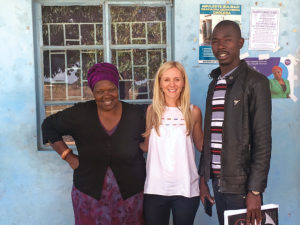A public health perspective

Rachel Mitrovich ’04
Global health practitioner
Pharmaceutical industry
Rachel Mitrovich ’04, a global health practitioner who works on the pharmaceutical side of improving access to vaccines through evidence-based policy development, said the coronavirus is re-orienting our relationship to the government, to one another and to the outside world.
“Even though my background is in global health and infectious disease, I never thought I would experience a pandemic that would sweep the globe and have such a significant impact on everyday life,” she said. “It is clear that we are entering unprecedented times, especially when it comes to the economy and health, and the unknown of what lies ahead can be unsettling.”
The U.S. approach to stopping COVID-19 has been faced with many obstacles. For Mitrovich, the biggest challenges surround testing and coordinated policy and action.
“We are not at the capacity we need to safely and appropriately identify those who are positive so we can trace their contacts and quarantine necessary individuals,” she said.
Mitrovich called for coordinated, restrictive measures at the national level in the form of a lockdown to allow for unaffected areas to support those in need, as well as protect populations where the virus has yet to take hold.
“We need more real-time data to inform these policies and for that data to be communicated to the public on a daily basis by individuals who are credible, can deliver simple-to-understand guidance and can display empathy regarding the impact this is having on our lives,” she said.
While a vaccine is critical to halting the spread of disease, Mitrovich cautioned that it’s going to take time and require a huge investment.
More than 30 companies and academic institutions are working to develop a vaccine to combat the novel coronavirus. Mitrovich called the current estimate from scientists of 18 months as ambitious as it typically takes five to 15 years to bring a vaccine to market.
“The reason why is because you need to go from isolating the pathogen to developing a vaccine product. From there, the vaccine is tested for safety and efficacy through a series of clinical trials, followed by regulatory approval. Next, you are faced with manufacturing and distribution—an incredibly complex and costly process. Given the global spread of COVID-19, this will also require the manufacturer to have the capacity to scale up production,” she said.
Mitrovich’s advice to communities and individuals coping with this new reality: it’s only temporary and please be patient.
“While the sacrifices we are making through social distancing, quarantine and isolation seem extreme and disruptive, they are incredibly important and the only defense we have until there are effective treatments or a COVID-19 vaccine. We must do everything we can to flatten the curve. If people look back and say it was an overreaction then it means as public health professionals we have done our job,” she said.
Mitrovich graduated from Wheaton with a bachelor’s degree in English. She received her master’s degree in public health from the Milken Institute School of Public Health at George Washington University and her doctorate in public health in leadership, management and policy from Boston University.
